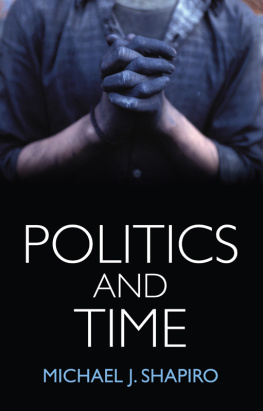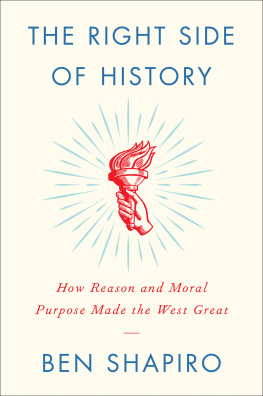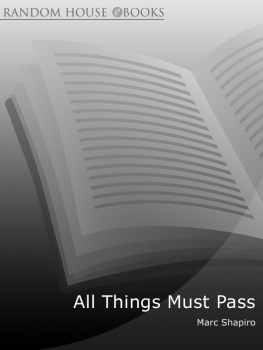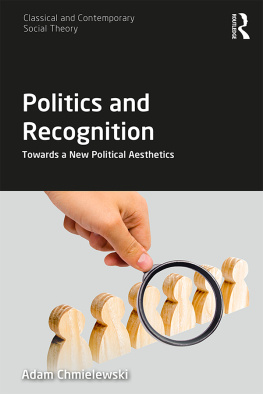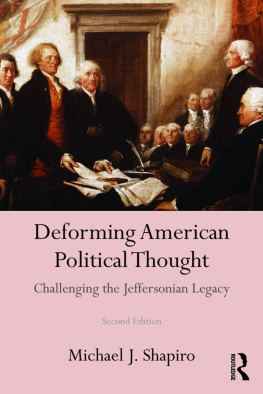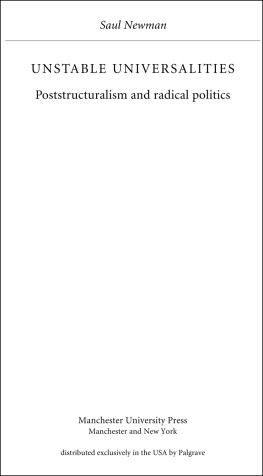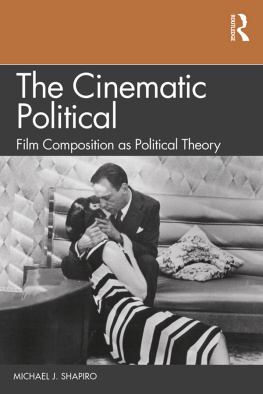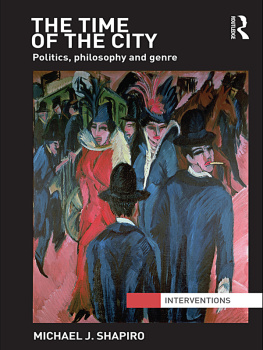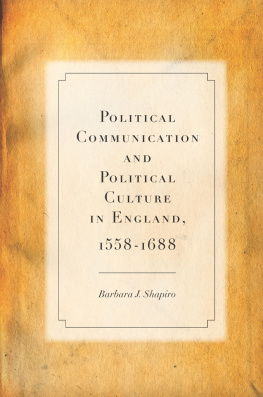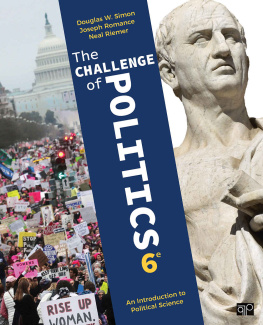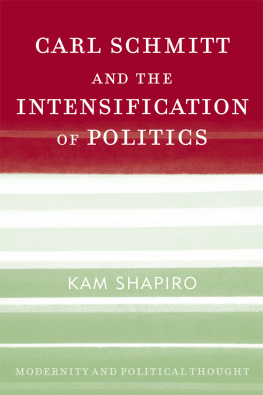
Copyright page
Copyright Michael J. Shapiro 2016
The right of Michael J. Shapiro to be identified as Author of this Work has been asserted in accordance with the UK Copyright, Designs and Patents Act 1988.
First published in 2016 by Polity Press
Polity Press
65 Bridge Street
Cambridge CB2 1UR, UK
Polity Press
350 Main Street
Malden, MA 02148, USA
All rights reserved. Except for the quotation of short passages for the purpose of criticism and review, no part of this publication may be reproduced, stored in a retrieval system, or transmitted, in any form or by any means, electronic, mechanical, photocopying, recording or otherwise, without the prior permission of the publisher.
ISBN-13: 978-1-5095-0780-1
ISBN-13: 978-1-5095-0781-8(pb)
A catalogue record for this book is available from the British Library.
Library of Congress Cataloging-in-Publication Data
Names: Shapiro, Michael J., author.
Title: Politics and time : documenting the event / Michael J. Shapiro.
Description: Malden, MA : Polity, 2016. | Includes bibliographical references and index.
Identifiers: LCCN 2015049590 (print) | LCCN 2016015994 (ebook) | ISBN 9781509507801 (hardback) | ISBN 9781509507818 (pbk.) | ISBN 9781509507832 (Mobi) | ISBN 9781509507849 (Epub)
Subjects: LCSH: Political sciencePhilosophy. | TimePolitical aspects. | DisastersPolitical aspects.
Classification: LCC JA71 .S425 2016 (print) | LCC JA71 (ebook) | DDC 320.01dc23
LC record available at http://lccn.loc.gov/2015049590
Typeset in 11 on 13 pt Sabon
by Toppan Best-set Premedia Limited
Printed and bound in the UK by CPI Group (UK) Ltd, Croydon
The publisher has used its best endeavours to ensure that the URLs for external websites referred to in this book are correct and active at the time of going to press. However, the publisher has no responsibility for the websites and can make no guarantee that a site will remain live or that the content is or will remain appropriate.
Every effort has been made to trace all copyright holders, but if any have been inadvertently overlooked the publisher will be pleased to include any necessary credits in any subsequent reprint or edition.
For further information on Polity, visit our website:
politybooks.com
Preface
Three brief commentaries on the event of National Socialism in Germany help me to situate my focus in this investigation of politics and time. The first, by the late sociologist C. Wright Mills, addresses the responsibilities associated with the vocation of critical thinking:
When events move very fast and possible worlds swing around them, something happens to the quality of thinking. Somerepeat formulae; somebecome reporters. To time observations with thought so as to mate a decent level of abstraction with crucial happenings is a difficult problem. Its solution lies in the using of intellectual residues of social-history, not jettisoning them except in precise confrontation with events.
Mills's observation raises the question of the event-adequacy of theoretical discourses. To pursue that question, I want to note my accord with answers provided decades later by Gilles Deleuze and Michel Foucault. When Deleuze famously insisted that philosophy must be worthy of the event, he was not simply suggesting that events serve to confirm or refute particular theories.).
While Deleuze's approach to the relationship between thinking/theorizing and events devolves toward an ethics, Foucault's moves toward a politics of discourse. In one of his earlier discussions of the value of a theoretical discourse (framed as a position on how to interpret the statements in a discursive formation), he refers to how to weigh the value of statements:
A value that is not defined by their truth, that is not gauged by the presence of a secret content; but which characterized their place, their capacity for circulation and exchange, their possibility for transformation, not only in the economy of discourse, but more generally in the administration of scarce resources[a discursive formation in short] appears as an asset finite, limited, usefulan asset that is, by nature, the object of a struggle, a political struggle.
In the passage's focus on epistemology, Foucault rejects both representational and hermeneutic approaches to statements, substituting a political pragmatics. What he adds to Mills's observation about the theoryevent relationship is a political economy of discourse. Treating statements as assets, he evaluates the discourses in which they function in terms of the resources they differentially deploy, creating spaces for recognition and action by advantaging some subjects of enunciation and disadvantaging others. Similarly, much of my analysis in succeeding chapters offers a politics concerned with the advantages distributed by interpretive practices. As I contrast the mainstream media's with critical artistic genres' interpretations of events, my emphasis is on the way a conceptual framing of events can accord recognition to subjects who are absent in the official discourses that constitute and react to key historical moments.
Crucially, the subjects whose recognition to which I refer are not to be regarded as preexisting unities that stand apart from the conceptual frames in which they are allowed to appear. The interpretive practices, resident in a variety of genres, in which subjects are accorded space, participate in fashioning those subjects as historical events. Foucault makes that point evident in his analysis of Edouard Manet's paintings. Manet, he suggests, was the painter most responsible for the emergence of the modern viewer.
The second commentary on the event of National Socialism I summon is by Primo Levi, a Holocaust survivor (who did not survive his survival). Levi provides an account of a micro event within the larger event of the Holocaust; it's an utterance by a child in his barracks in the Auschwitz Lager, where he was a prisoner. The child, Hurbinek, was the smallest and most harmless among usthe most innocent: Hurbinek was a nobody, no one knew anything of him, he could not speak and he had no name, that curious name Hurbinek had been given to him by us, perhaps by one of the women who had interpreted with those syllables one of the inarticulate sounds that the baby let out now and again.
The third commentary on the event of National Socialism I want to reference is by another Holocaust survivor, the Nobel prizewinning author, Imre Kertsz (who survived his survival). In response to an interviewer's question about how the Holocaust has been treated as historical memory in the East and the West, Kertsz provides a way to conceive such events: The Holocaust is an absolute turning point in Europe's history, an event in the light of which will be seen everything that happened before and will happen after.
My investigations of politics and time in this book are focused initially on another reality-shattering event, the dropping of an atomic bomb on Hiroshima, in part because my inspiration for this study is owed to an invitation to contribute to a monograph issue of the journal Thesis Eleven, devoted to the seventieth anniversary of the atomic bombing of Hiroshima. Having been recently attuned to a grammar-temporality rendering of that atrocity by Rosalyn Deutsche's excellent book Hiroshima after Iraq, I responded to the invitation with an essay entitled Hiroshima Temporalities (the prototype for My opening chapter prepares the way for my analysis of the Hiroshima event in two ways. First and foremost, I respond to the issue of events by reviewing and applying the critical philosophical perspectives that shape my analyses and, second, I do a reading of Chris Marker's (semi)-documentary
Next page
